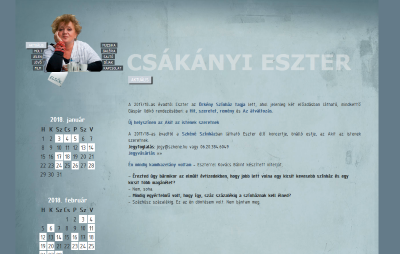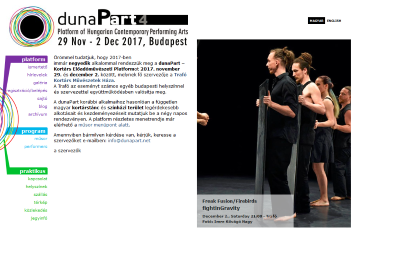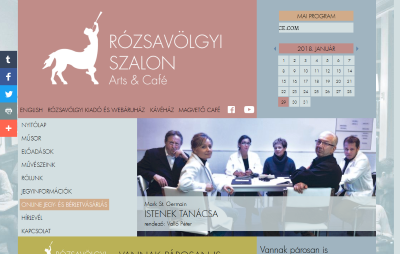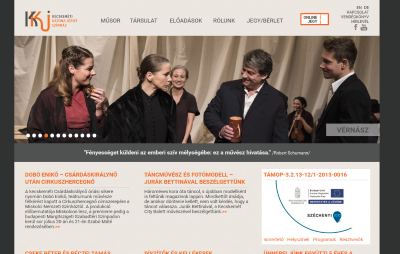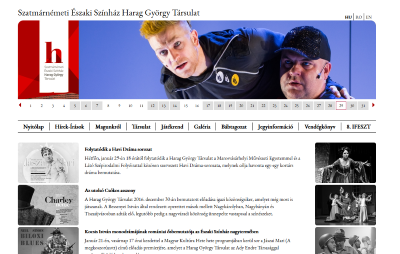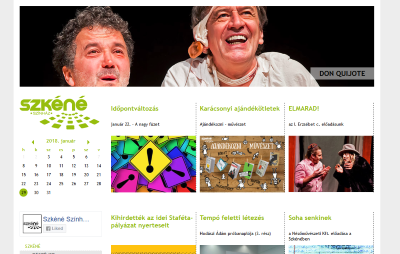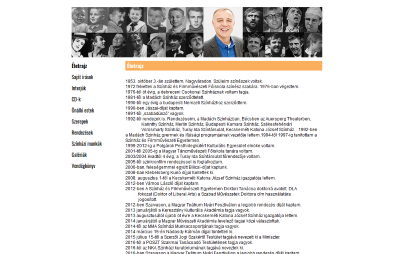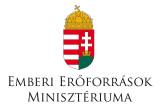Színházak
Oskaras Korsunovas Színház
William ShakespeareHamlet
- Hamletdán királyfiDarius Meskauskas
- OpheliaPolonius lányaRasa Samuolyte
- PoloniusállamtanácsnokVaidotas Martinaitis
- Gertrudkirályné, Hamlet anyjaNele Savicenko
- BernandoTomas Zaibus
- RosencrantzHamlet egykori iskolatársaTomas Zaibus
- I. sírásóTomas Zaibus
- HoratioHamlet barátjaJulius Zalakevicius
- Százados Frotinbras seregébenJulius Zalakevicius
- Fortinbrasnorvég királyfiJulius Zalakevicius
- Claudiusdán királyDainius Gavenonis
- Hamlet apjának szellemeDainius Gavenonis
- MarcellusGiedrius Savickas
- GuildensternGiedrius Savickas
- II. sírásóGiedrius Savickas
- rendezőOskaras Koršunovas
- díszlettervezőOskaras KoršunovasAgnė Kuzmickaitė
- jelmeztervezőAgnė Kuzmickaitė
- fénytervezőEugenijus Sabaliauskas
- zeneszerzőAntanas Jasenka
- hangVilutis Viius
“We’re in acute need of self-analysis, in order to understand our environment and the decisions we make about living. We may even need to nurture a certain ‘paranoia’ in ourselves, in order to protect ourselves from making fundamental errors in understanding the world. We need to overcome the calm the surrounds us, we need to learn and relearn that it’s an illusion.
That’s why Hamlet is the most topical play for our times. The Hamlet question seems absurd to us at first. Our existence is so comfortable, and the future seems almost guaranteed. But actually the future is to be found inside each of us, and not in political slogans or commercial advertising. We need to tear the veil that hides life from us, we need to rip up our supposedly safe existence. Security can be very dangerous.”
Oskaras Korsunovas
In the director’s creative biography Hamlet will continue the sequence of large-format productions based on famous classical texts (Oedipus Rex, A Midsummer Night's Dream, The Most Beautiful and Lamentable Story of Romeo and Juliet, The Road to Damascus and The Master and Margarita).
Oskaras Korsunovas is fond of saying that his aim is to produce contemporary dramaturgy as classical, and the classical works – as if it were contemporary dramaturgy. Hamlet is also not going to be a historical performance restoring the spirit of ancient epochs. The famous play by Shakespeare should help us to perceive and convey the spirit of the present, the director’s own generation, which he describes as “a generation living in a kind of eroticized illusion rather than the real world. It is calculating, well-adapted and satisfied with itself. Alongside it is immature and unwilling to take decisions obligatory for a grown-up person. Recently nobody talks about the necessity to change – only about the need for security. This generation lives as if behind a curtain separating it from reality, and it is necessary to tear off this curtain, as illusory peace and security can be very dangerous. Thus we urgently need ruthless self-analysis, so that we could understand our environment and actions. Only in this way can we save our future, which is born in ourselves and not in political or commercial slogans.” Another important theme encoded in the performance is the interaction of theatre and reality. “What happens when two realities – of life and theatre – meet, what kind of reality is born out of this interaction? And to what extent is the mousetrap set by theatre for life effective?” asks the director.
The construction of the performance is dictated by the clear structure of the set design – mobile dressing room tables with mirrors are once combined into an ominous monolith, once scattered around the stage – sometimes loose, sometimes arranged into strict geometrical figures: a circle, or either parallel or resolutely intersecting lines. The problems of an individual and his reflection, image and representation are transferred from the set design to the conceptual spaces of the performance: it begins with the actors looking at their reflections in the mirror and asking themselves: “Who are you?” Subdued intimate whispers turn into a thunderous avalanche of sounds cried out desperately, without expecting an answer or willing to hear it.
Helmutas Sabasevicius, “European Theatre Awards Given in Salonica”, www.balsas.lt
This “Hamlet” by Oskaras Korsunovas is the most uncompromising of all his productions. The truths are shouted out here; it is cruel, explicit, bleeding. There is not even a dash of sentimentality, weakness, and doubt. The director knows exactly why he has chosen “Hamlet”, and why it is his alter ego today. (…) It is Korsunovas’ “self”, his life, a shelter of his lost love, his theatre, his failures, which always end in a triumph of the great theatre, his constant tension, his constant search, his sensitivity in shouting out the truth and not being afraid to say: I’m blind, like you, because I don’t know what I’m doing and how it should be done.
Daiva Sabaseviciene, “Awards to the Best of the Best in European Theatre. Impressions from the Events in Salonica”, 7 meno dienos
2008. 09. 05.
Az előadás hossza: 180 perc 1 szünettel


